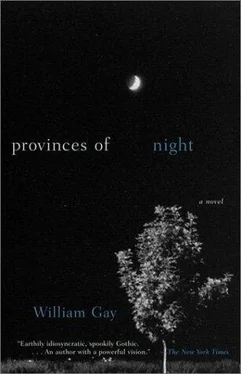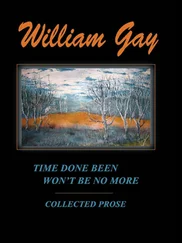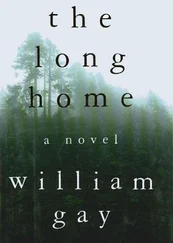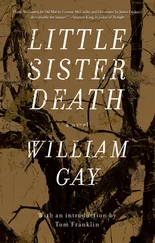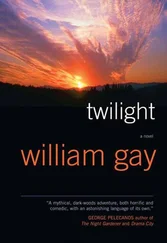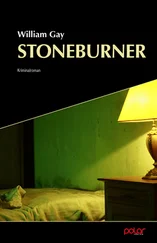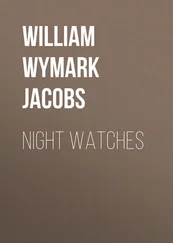IT HAD NOT rained for some time and the road lay thick with a dust pale and fine as talcum. It rose light as smoke with the old man’s footfalls and hung suspended and weightless in the air, whitened the cuffs of his trousers and pressed itself covertly into their folds and into the webbing of his shoelaces. It was early but already hot. The sun lay over the eastern horizon and burned its way toward him through the trees with a bluegold light. When he crossed from the road into the edge of the fallow field the earth beneath the trees where the wild oats did not grow was pale and baked hard as clay from a kiln, faulted with cracks and crosshatched lines like defects in the surface structure of the earth itself.
Forty years ago he had set out a row of cedars that extended for over a quarter of a mile, that ran from the road he’d just left and crossed the wide field to the fencerow that had enclosed his garden. He thought for an amused moment that if he was ever remembered for anything it would likely be the cedar row. His wife had finally had enough of his sinful ways and doings and his sons’ lives had followed strange and destructive bents but the cedar row was as straight as if they’d been set to a staked line, and he stood for a moment leaned on the stick and staring down the row cedar on cedar until they diminished before the house he’d built, bluelooking and cool in the deep morning shade of the woods.
He heard a screen door slap to, though he could see no one, and the sound seemed to have a curious quality of timelessness about it, something that had happened years ago with the sound just now reaching his ears.
If she came out, if she came out.
He stood, leaned on the stick, watching. A hawk circled the field in lowering revolutions, its feathers trembling in the sun like light flickering on water, shrill cries falling to earth bright as broken bottleglass.
He remembered the man who had come looking for Warren with such dire intent.
There was the cedar the man had been standing beneath, looking up and batting his eyes in surprise, expecting a seventeen-year-old Warren but encountering instead the old man himself, bad news that morning, hungover and violence moiling about his feet like a vicious watchdog.
He’d sent his emissary to the house and waited with his two brothers.
It’s a man by the cedar row wants to see Warren, the boy said.
What’s he want?
The boy looked away, he just wants to see Warren.
Well just let me get my hat, the old man said. It may be that it’s me he needed to see all along.
The man stood with his cap cocked over one eye, a fistsize chew of tobacco in his jaw, a hawkbill knife printed against his leg in thin worn denim.
The man was on the ground before he could even get the knife out and after a while he forgot all about it. He might just as well have left it at the house.
Motion drew his eye back to the house. A figure crossed the porch. He was so far away he could discern little. The vague illusion of a blue dress, that was all, but what he was had been gone for fifty years, frozen in his mind as if it happened yesterday, a young woman coming onto a porch, a door slapping to behind her, a pan of dishwater slung into the yard. Just that, but the woman, who had been his wife, was so vibrant and alive that she seemed a symbol representing life itself, and the dishwater she threw glittered in the sun like quicksilver.
At length he turned back the way he’d come. Brady seemed to be avoiding him and he thought that perhaps he might catch him out around the house. But dogs had begun to bark somewhere below the house, and he wondered if maybe they’d caught his scent. The dogs he’d seen around the trailer that night had a distinctly dangerous look. Now the dogs barked on and on dementedly as if they would never shut up. The old man had never been much for barking dogs and he wondered how they stood the racket. The dogs were company, Brady had always said, but company like that he would have long ago put on the road.
He was halfway back across the field when something happened that he had never seen before or heard tell of. A rattlesnake fell out of the sky and thudded onto the path six or eight feet in front of him. This so stunned Bloodworth that he froze and just stood staring at it in a kind of slackjawed disbelief. Then finally he looked up as if to see were more on the way. A huge hawk drifted on the updrafts, the white undersides of the wings like polished chrome in the sun.
Got somethin you couldn’t handle, didn’t you? the old man asked, then added, or decided you didn’t want no part of.
He wondered if the hawk had been snakebit but he guessed not for after a moment it began to ascend until it was just a black dot printing itself on the blue void and ultimately vanishing as if he’d just been imagining it all along.
The snake was a diamondback rattler, thick as the old man’s arm. He approached it with caution, brandishing the stick like a club. The rattler was stunned but it was not dead. Its tail moved sluggishly, like a snake caught out in wintertime. He tried to count the rattles but could get no precise count. The snake was making no attempt either to escape or bite him, and he figured it was so addled it couldn’t fathom where it had gotten itself to.
Damned if you won’t have a story to tell the rest of them when you get home, he told it. But nobody is going to believe a word you say.
Copperbrown and black, the snake looked atavistic and evil, its ancient eyes cold and heartless as time itself. Its coils moved on themselves sluggishly, thick and heavy with poison. It seemed to be recovering itself but it still wasn’t crawling away.
He leaned and placed the tip of the carved stick lightly on the rattlesnake’s head, serpent to serpent. He was going to grind it into the earth then he stopped. Somehow it didn’t seem fair. Something flies down and hooks its claws into your flesh and soars away with you, high into the thin blue air, the comforting earth miles away and no more than a remembered dream. Then it drops you, and you slam into the ground and you lay there with your senses knocked out. After you finally start to get at yourself, and marvel at your incredible escape, an old man limps up and shreds your head into the clay with a hickory stick.
All right, he told the snake. I’ll tell you what I’m goin to do. I’m fixin to let you go. But the only people you can go into the world and bite are my enemies. Folks with guns and badges, khaki britches. Prison guards with shotguns. Lawyers, no limit on them. Maybe an undertaker or a insurance salesman every now and then. But no kids. No kids and no folks just tryin to scratch out a livin. You bite one of them, just one, and it’s me and you, I’ll be on your ass like a plague, I’ll finish what I started.
He moved the stick. After a while the snake began to crawl slowly away. It went into the cedars, finally vanished as if it had been no more than the coppery cedar needles and a trick of the light.
The old man went on, glancing skyward every now and then. He was no believer in signs and portents, but if the Almighty was going to rain serpents on him out of a clear blue sky he figured he might as well be indoors.

WE PULLED INTO Blythesville, Arkansas, one time, Sharp told Fleming. He opened the bottle of Coca-Cola and slid it across the bar to him. We was flat broke, he went on. Not a cryin dime between us. Hadn’t eat in nearly two days. We run out of gas right past the city limits sign and had to get out and roll the car out of the street.
It was on a Saturday mornin and there was a lot of folks stirrin about. People haulin cotton into town on wagons to the gin. Folks come in on Saturday to trade. Saturday was a big day back then. Saturday was what got you through the week. What do we do now? I asked E.F.
Читать дальше
